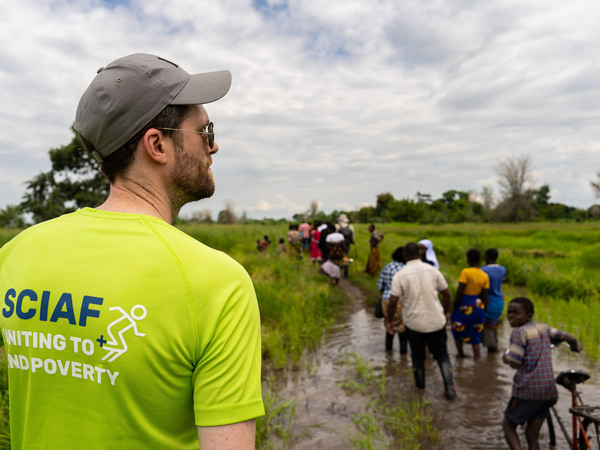Peace allows development for people & planet
26 September 2024

This article written by Ben Wilson, SCIAF's Director of Public Engagement, first appeared in Pax Christi Scotland's latest newsletter.
In 2023, in a village in the south of Malawi, I met a woman called Sofia, whose life had been completely turned upside down by climate change. In 2015, Sofia and her neighbours had been rehomed up river, due to torrential rains and flooding. In Malawi, people are deeply connected to the land. The land is their home, their identity, their inheritance and vital to binding the community together. When they had to flee their home in 2015, it caused heartache for the whole village.
When I spoke with Sofia in 2023, she was living in a metal temporary shelter. Her village had been hit by Cyclones Idai and Kenneth in 2019, and again in 2022 by Cyclones Ana and Gombe, which destroyed her home. Nine months later, she was still living in temporary accommodation with about 20 other women and children, while her husband was housed elsewhere with other displaced men. Torn from her family land, separated from her loved ones, and living in a divided village cut in two by a seasonal river, Sofia's life had been turned upside down.
People often ask why SCIAF, which works on poverty and social justice, focuses on climate change. For many, climate change is about recycling, public transport, and perhaps eating less meat. Many think of the impact on polar bears, before they think of the impact on people.
It is for people like Sofia that SCIAF campaigns so much on this issue. Climate change disproportionately affects the poorest communities, who have contributed the least to the problem but suffer the most. These populations, already vulnerable to poverty, hunger, and inequality, are the first to feel the impact of rising temperatures, unpredictable weather, and natural disasters. Climate change threatens to undo decades of progress in areas like health, education,and economic stability.
Beyond its impact on development, climate change also poses a significant threat to global peace. Climate change acts as a “risk multiplier” of conflicts, exacerbating underlying vulnerabilities and deepening existing grievances. In places such as Ethiopia, Sudan and Syria, resource scarcity and increased competition for water and arable land has further precipitated simmering tensions bubbling over into violence. By 2050, the IEP predicts 1.2 billion people could be displaced globally due to climate change. This will only increase the potential for violence to erupt, and deepen the vicious cycle whereby spiralling instability hinders the potential of countries to implement climate solutions.
For many decades, Pax Christi has brought the message to the world that without peace, we have nothing. Without peace there can be no “development”; without peace, there can be no human rights. Without peace, people will never have a world where they can fulfil their full potential. One must only look at Gaza to see the devastation brought by the horrors of war, which can put efforts towards integral human development back to ground zero.
Just as peace is a fundamental prerequisite for development, so too is the care of our planet. Without a habitable environment, without the clean air we breathe and the natural resources we depend on, none of our efforts toward development, peace, and security will endure. In the face the looming threat of irredeemable environmental catastrophe, it is hard to stay hopeful, just as it was 60 years ago when the prospect of a nuclear war felt within touching distance. Yet just like all global threats and injustices, these interconnected crises thrive on apathy and despondency. Hard as it may be, we have a duty to continue raising our voices and keep building a better world day by day.


Tackling climate change should be at the top of John Swinney's in-tray as he becomes First Minister.

SCIAF reacts to the news that the Scottish Government plans to reopen the 2019 Climate Change Act.

We must introduce a new law protecting human rights, the environment and the climate.